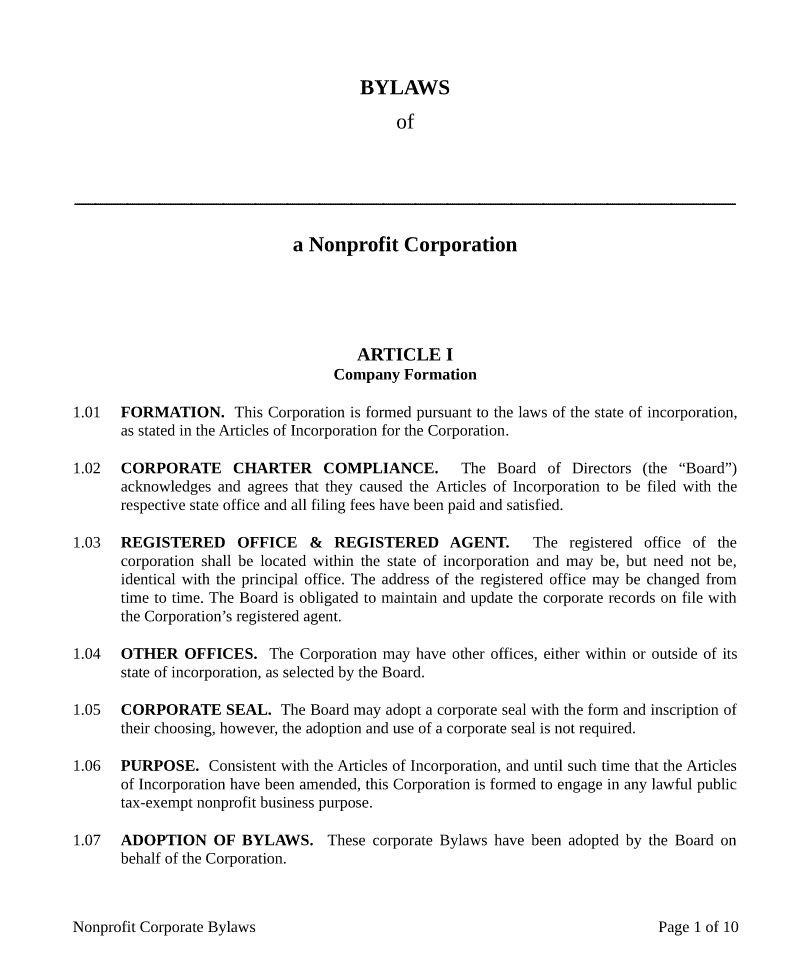
Nonprofit bylaws list out the rules and internal processes for the board of directors to follow, including things like how to vote, when to hold board meetings, how to keep records, and more. You can think of the bylaws as your nonprofit’s user manual.
Crafting your nonprofit bylaws is the first step that your nonprofit will make. Nonprofit bylaws are not filed with the state of Delaware, but they are are an important part of maintaining a successful nonprofit. Our attorney-drafted nonprofit bylaws can help you get started.

A nonprofit needs bylaws in order to give the board of directors, officers, and employees a rule book to stay in legal compliance. This includes all the internal processes, from solving conflict to appointing new board members. Unlike your Delaware certificate of incorporation, you do not need to file your bylaws with the state.
The bylaws include internal processes where there are no state-mandated processes already established—or processes that add onto the already-there state requirements to make processes more thorough and personalized.
Delaware nonprofits are not legally required to have bylaws in order to maintain good business standing with the state. DE Code § 109 states that nonprofits “may adopt” bylaws, making them technically optional. However, adopting bylaws is highly encouraged. Having clear bylaws is essential to running your nonprofit successfully.
Beyond being used to solve disputes and for guidance during emergencies, bylaws work as confirmation of the nonprofit corporation’s existence. They are used for donors looking to invest and for proof of business for opening a bank account.
Most importantly, they are required by the IRS if you are submitting your nonprofit for 501(c)(3) tax-exempt status. Your bylaws must be included with your tax exemption application, and will become public record at that point.
By having clear bylaws, a nonprofit maintains control over the internal processes of the business. Bylaws streamline decisions and help prevent disputes from arising, keeping you in charge of how things are handled. However, if the bylaws are not comprehensive, the state of Delaware might step in when disputes arise and decide if the actions were legal or not. Bylaws keep the control in the internal processes.
Want to learn more? Check out our Guide to Nonprofits.
Your nonprofit bylaws can include anything not already covered as a legal process in Delaware, as long as it does not contradict the state’s statutes or your nonprofit’s certificate of incorporation. Typically, this includes information such as:
Yes, bylaws are legally binding. Alongside federal and state business statues, your bylaws are practices that the nonprofit must follow. This is one reason why making sure that the bylaws are adopted at the first organizational meeting is important.
Not necessarily. A nonprofit’s bylaws are fundamentally an internal document that does not need to be submitted to the state or made public. However, if your nonprofit applies for the 501(c)(3) tax-exempt status with the IRS, your bylaws must be included and will then be made public.
Drafting clear and thorough nonprofit bylaws can be tricky—that’s why we’ve included our free attorney-drafted template for you to use.